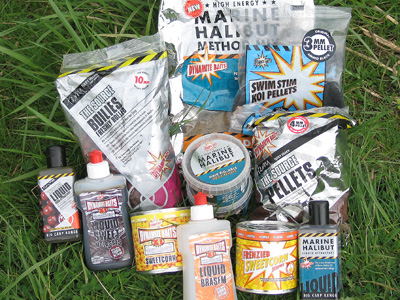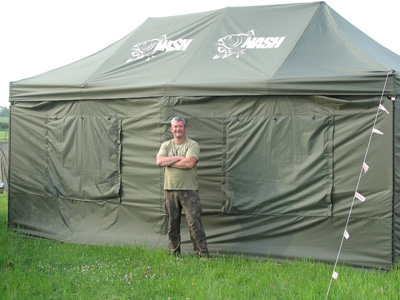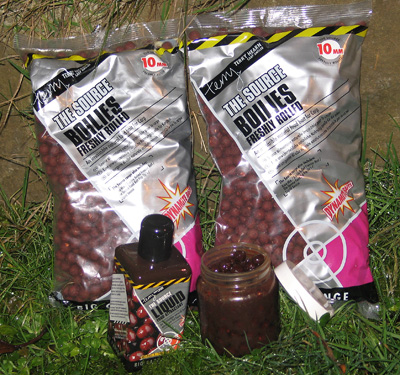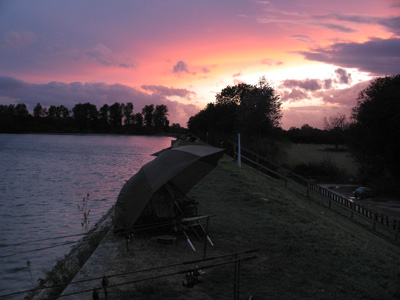First off can I take the opportunity to say ‘thank you’ to everyone who took the trouble to pass on their congratulations after reading last month’s piece on my carp campaign on the club water that resulted in the capture of my PB common. It’s really nice to receive that kind of feedback, especially when I hear that it has helped to inspire someone else in their own fishing. I just wish I had a few more success stories to write about!
As promised last month I’m going to devote a good proportion of this piece to some of the questions I’ve been asked about angling related sponsorship and to highlight what can be involved with tackle and/or bait company consultancy.
Sponsorship and consultancy appear to be quite ‘hot topics’ just at the moment, and over the last few years I bet that I’ve been asked questions relating to both as often as I’ve been asked about any other angling related subject.
 I’ve done some quite specific consultancy for tackle companies since 2001 and have been involved with both Dynamite Baits and Nash Tackle in sponsorship/consultancy roles since about 2004. Therefore I feel that I can shed a little light on the subject from a position of relative experience.
I’ve done some quite specific consultancy for tackle companies since 2001 and have been involved with both Dynamite Baits and Nash Tackle in sponsorship/consultancy roles since about 2004. Therefore I feel that I can shed a little light on the subject from a position of relative experience.
Let’s look at some of the questions that I’ve been asked first.
The most frequently asked question has to be, “How do I get to be sponsored or become a consultant?”
My initial response to this is usually to highlight that I’ve never gone chasing after, or even asking about, a sponsorship or consultancy role. I’ve always been approached by the company concerned asking whether I’d like to join them. This is an important point, as it’s a fact that there’s no shortage of anglers out there who are either looking for or hoping for a sponsorship/consultancy role, but relatively few companies looking to hand them out.
I would guess that most of the major firms are inundated with enquiries but rarely, if ever, consider anyone for such a role that they’re not already familiar with. I already had a very strong list of PB’s for nearly every major coarse fish species in the UK, but it wasn’t until I actually broke the barbel record for the first time back in January 2001 that I received my first offer of a consultancy role.
My next offer of a consultancy/sponsorship role wasn’t until after I’d been awarded both the Drennan Cup and Fox Cup annual awards for my results in 2001 and the 2001/2002 season. As I was so busy at the time with my regular work, my family commitments and everything else, I felt that I wouldn’t be able to do the role justice and although I was very grateful, I politely turned the offer down.
Fortunately, my fishing efforts continued to pay off over the next couple of years and I continued to land a number of superb fish, including a second record barbel in October 2004.
Soon after I was approached by Dynamite Baits with an offer of sponsorship, which I very gratefully accepted. The following year, partly through my friendship with Gary Bayes, I started to develop a relationship with Nash Tackle, which has continued to grow. I’m very pleased to say that I still have a very good relationship with both of these companies and I’m proud to be associated with them through my continuing sponsorship/consultancy roles.
 I hope the above has helped to illustrate that these types of roles are unlikely to come about without a great deal of effort. You need to bring yourself to the attention of the major companies, either through a series of exceptional catches (a ‘one off’ is unlikely to impress, no matter how huge) or through some sort of media coverage, but preferably both. Ringing, or e-mailing a firm’s head office to tell them how good you are, or are about to become, is unlikely to get you anywhere unless you’re already becoming very well known.
I hope the above has helped to illustrate that these types of roles are unlikely to come about without a great deal of effort. You need to bring yourself to the attention of the major companies, either through a series of exceptional catches (a ‘one off’ is unlikely to impress, no matter how huge) or through some sort of media coverage, but preferably both. Ringing, or e-mailing a firm’s head office to tell them how good you are, or are about to become, is unlikely to get you anywhere unless you’re already becoming very well known.
It surprises me how many anglers assume that sponsorship etc is somehow just a matter of luck, or perhaps comes about by simply being a bit pushy or loud; I wouldn’t recommend either approach.
I remember one time when I was bream fishing on one of the massive Cambridgeshire gravel pits. I was approached by a group of three or four lads, all in their late teens, who were on a bit of a road trip, checking out a number of the better known carp waters in the area. One or two of them recognised me and the conversation soon turned round to sponsorships and how this would fit in with their plans.
The lads explained that as summer was approaching they were all looking forward to a good chunk of spare time during their summer holidays before starting further education or whatever and had therefore decided amongst themselves that they would make a concentrated effort on their carp fishing during this time. They went on to say that because of this period of concentrated effort they would obviously be mega successful and were bound to land stacks of monster carp between them… so it would clearly be in the interests of some of the top tackle and baits firms to sponsor them prior to their inevitable success and subsequent fame; so who should they approach? They appeared to be perfectly serious, so I asked them about their previous experience and whether they’d had some impressive big fish catches that they could highlight?
It transpired that a couple of the lads had, ‘done alright’ on one or two of their local waters, but that between them they didn’t really have anything else that they could brag about. Amazingly they still appeared somewhat crestfallen when I suggested that they shouldn’t bother contacting anyone at all about possible sponsorships and that they should instead concentrate their efforts on getting into some quality waters and building up an album of good fish before considering approaching any of the tackle or bait firms.
The next most popular question would probably be, “How much can I expect to get paid?”
My standard response to this is usually, “Nothing”.
This might surprise many, but there will only be a handful of sponsored anglers who earn anything like a decent amount of money by simply going fishing and turning up at a couple of shows each year. A top consultancy role might have some money involved, but usually only if the individual concerned is fulfilling a proper design consultancy role with significant time and effort going into the development of a specific product or products.
Other than a more standard salaried position, another way to ‘reward’ the consultant may be to pass on a small percentage of the profit of the product(s) to the consultant once they go on sale.
Most sponsored anglers aren’t paid at all, with the sponsorship itself usually consisting of either an amount of free or cut price tackle/bait. The amounts of bait/tackle involved will obviously vary and what the bait/tackle company might expect in return may also vary quite considerably. Many sponsorship arrangements are simply a gentleman’s agreement between the two parties, but sometimes a more formal contract type arrangement might be included to help ensure that the terms of the agreement are clearly understood by everyone involved.
All the above usually leads to some questions around what might be expected of the sponsored angler or consultant. As this can vary quite considerably there’s no straightforward answer.
A simple sponsorship may simply involve a few kilos of free or cheap bait each month in exchange for the bait being mentioned in any associated catch reports in the press and a photo or two for the firm’s website. A more complex arrangement may involve larger quantities of bait and/or tackle, with the sponsored angler expected to make the most of any promotional opportunities, press and media coverage as well as attendance at a number of shows etc.

The fact is that all of the established tackle or bait firms are not about to start giving product away without expecting something back in return. Sponsored anglers receiving a decent amount of free product are normally expected to give up a fair amount of time, effort and may even be expected to do a good bit of travelling about to various events etc, in order to promote the products involved in a number of different ways.
Of course a sponsored angler may also be expected to catch a few fish! At the end of the day the customer is buying the products in the hope that he or she will either catch more, or bigger, fish. It follows therefore that part of the selection criteria that a bait/tackle company might well use in helping to choose suitable anglers to sponsor etc. will be a proven ability to put a few fish on the bank! Obviously catching fish cannot be guaranteed no matter how good you are, but any expectation of this type, even if only implied, can be an unwelcome pressure, especially as part of an activity that’s meant to be a pleasure.
As I hope I’ve been able to illustrate, there’s generally much more to being a sponsored angler or a consultant than simply enjoying the benefits of a stack of free tackle or bait. Getting into these kind of positions in the first place usually means already being a very successful angler, with all the time and effort that has gone into achieving the results.
Then there’s often further investment of time and effort into the various promotional activities, which may subsequently have an impact on the time available to do the fishing that you really want to be doing. Commitment to a particular firm may also mean potential restrictions on the choice of tackle or bait that an individual can be seen to be using. In addition there may also be a certain pressure to catch fish, which may affect the enjoyment factor of simply going fishing and may also lead to changing venues and fishing differently in order to produce results that can be used in the media and/or promotional material.
For my own part I’ve been very careful in terms of the companies that I’ve become associated with and also careful to establish what’s required from me to satisfy the relationship so that everyone is kept happy.
 For instance, as I was already using a lot of bait from the Dynamite range anyway and had recently landed the UK’s first 20lb plus barbel on their Source boilies, it wasn’t a difficult decision to say ‘Yes’, when I was asked if I’d like to be sponsored by them. That was back in 2004 and I’m very glad to say that our partnership is still as strong as ever.
For instance, as I was already using a lot of bait from the Dynamite range anyway and had recently landed the UK’s first 20lb plus barbel on their Source boilies, it wasn’t a difficult decision to say ‘Yes’, when I was asked if I’d like to be sponsored by them. That was back in 2004 and I’m very glad to say that our partnership is still as strong as ever.
Likewise, my relationship with Nash Tackle is also a long-term one. In this particular instance one that has continued to grow and developed over a period of time. When it started I was already using, and a big fan of, a wide range of Nash items and I’d sometimes end up talking about various products and any potential development with Gary Bayes when we were both fishing Fen Drayton. This gradually developed into an unofficial consultancy type role that has over the years evolved into my current involvement with the firm that encompasses both the regular carp orientated Nash Tackle brand and the range of products aimed towards the specialist and/or commercial fishery angler that come under the Peg One banner.
I would imagine that a sponsorship/consultant type position would not suit everyone and that there’s probably more work involved than most people realise. My own experiences have been very satisfying and I know plenty of people who are enjoying what they’re doing in similar roles. However I also know several anglers who have been in these types of roles, but have eventually dropped out, preferring the complete freedom to choose whatever bait/tackle they want to use, more time to devote to their own fishing and without the feeling of being under any sort of pressure to catch fish.
Clearly sponsorships and consultancy roles will vary enormously from firm to firm and from individual to individual, so I can’t possibly begin to describe what each might be like. I’ve attempted to highlight a few possibilities and given a few examples from my own experience that might be useful for anyone considering such a role in the future.
Finally I ought to mention that I’ve been pretty busy with work and a whole host of other things, but I’ve still managed to get and do a bit of fishing in between everything else. When time is at a premium and longer sessions are impractical, day trips to do a spot of perch fishing can be a great way to maximise any opportunities during the autumn period.
 The reservoir that I’ve fished has got potential for a very big perch, but the bites are always very few and few between and it seems that the timing has to be absolutely ‘spot on’. It would appear that the big perch are rarely close enough to the fishable bit of bank to get caught, but usually migrate close enough once or twice a year so that a handful get caught during a short ‘window of opportunity’ that normally lasts no more than a couple of weeks or so.
The reservoir that I’ve fished has got potential for a very big perch, but the bites are always very few and few between and it seems that the timing has to be absolutely ‘spot on’. It would appear that the big perch are rarely close enough to the fishable bit of bank to get caught, but usually migrate close enough once or twice a year so that a handful get caught during a short ‘window of opportunity’ that normally lasts no more than a couple of weeks or so.
I wasn’t able to get a bite myself, but my friend Ian had a fish of about a pound or so at ‘last knockings’ on our first trip. Subsequent trips were blanks, so it’s proved to be as hard as ever and again highlights the fact that the timing of a trip can be a crucial element in the planning for fish that are heavily influenced by the seasons as well as conditions at the time.
Until next time, happy fishing!










